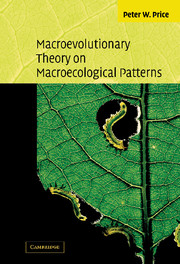Book contents
- Frontmatter
- Contents
- Preface
- Acknowledgments
- 1 The general thesis
- 2 Historical views on distribution, abundance, and population dynamics
- 3 The focal species – Basic biology
- 4 The focal species – Emergent properties
- 5 The focal group – The common sawflies
- 6 Convergent constraints in divergent taxonomic groups
- 7 Divergent constraints and emergent properties
- 8 Common constraints and divergent emergent properties
- 9 The thesis applied to parasitoids, plants, and vertebrate taxa
- 10 Theory development and synthesis
- Glossary
- References
- Author index
- Taxonomic index
- Subject index
Preface
Published online by Cambridge University Press: 04 December 2009
- Frontmatter
- Contents
- Preface
- Acknowledgments
- 1 The general thesis
- 2 Historical views on distribution, abundance, and population dynamics
- 3 The focal species – Basic biology
- 4 The focal species – Emergent properties
- 5 The focal group – The common sawflies
- 6 Convergent constraints in divergent taxonomic groups
- 7 Divergent constraints and emergent properties
- 8 Common constraints and divergent emergent properties
- 9 The thesis applied to parasitoids, plants, and vertebrate taxa
- 10 Theory development and synthesis
- Glossary
- References
- Author index
- Taxonomic index
- Subject index
Summary
The field of distribution, abundance, and population dynamics has never fully embraced evolutionary theory as a guiding light or a central theme. The field has remained largely ecological in its focus, in spite of many other areas of ecology becoming more integrated with evolutionary thought. However, taking an evolutionary view enables a synthesis of many biological aspects of organisms and their ecology. An integration of behavior, ecology, and evolution is essential in a full understanding of any kind of interaction between a species and its environment. Every species is molded by past events, selective forces, and the “baggage” of its lineage. Hence the ecology of a species is very much a function of evolved traits involving behavior, physiology, and life history.
It is all the more surprising that population dynamics has remained largely aloof from evolutionary thinking when we recognize that distribution, abundance, and dynamics of organisms have played a central role in the development of ecology. The field is fundamental in solving human problems with pest species in agriculture, horticulture, forestry, and epidemiology, and the history of ecology is full of rich debates among major professional ecologists. These debates would have been enriched, and perhaps resolved, if evolutionary points of view were given equal play.
More than 20 years ago our research group began working on an uncommon sawfly, about which very little was known, and its relatives were poorly known also.
Information
- Type
- Chapter
- Information
- Macroevolutionary Theory on Macroecological Patterns , pp. vii - viiiPublisher: Cambridge University PressPrint publication year: 2002
